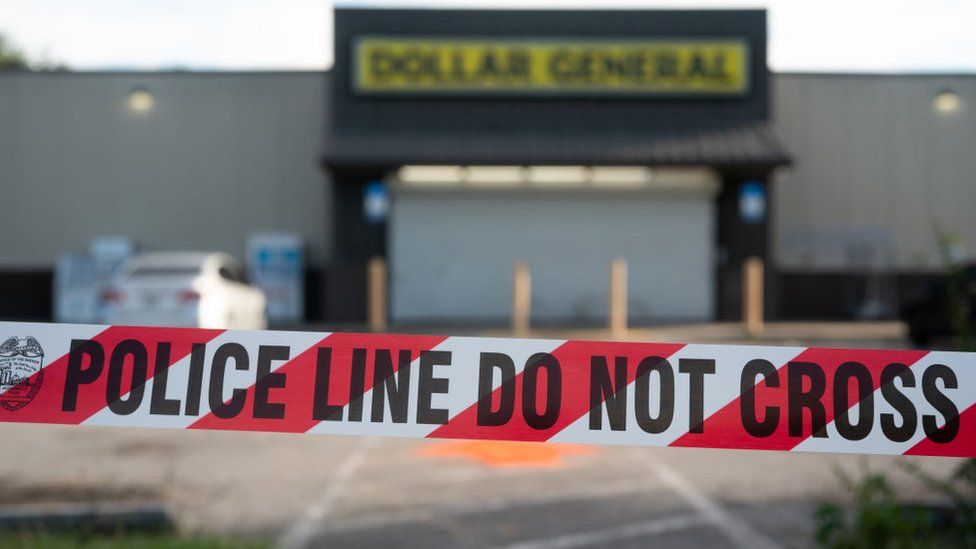In the hours after a racially motivated shooting in Jacksonville, Florida over the weekend, parts of the fringe right and far-right of American politics were quick to compare it with a previous mass shooting – alleging a politically motivated cover-up and conspiracy. But their claims run counter to facts laid out by police and extremism experts.
The messages began just a short time after news broke of the murder of three black people by a white man in his 20s.
One typical post from one influencer on X, the site formerly known as Twitter, was seen at least 1.4 million times by Monday evening – and was one of just one of hundreds of similar posts.
They all claimed or implied that the documents left by the Jacksonville gunman were publicly released by authorities, and compared the situation to a shooting at a Christian school in Nashville, Tennessee in March. That assault left three children and three adults dead before the attacker was killed by police.
No documents or manifestos written by the attackers have been released in either case.
Some fringe accounts and far-right activists claimed that the Nashville shooting was motivated by gender ideology or hatred of Christians and hinted at a politically motivated cover-up to hide the truth.
But this narrative doesn’t fit the facts, according to experts and law enforcement statements.
‘Manifesto’ or not?
Although police initially cited journals and other writings left by the Nashville shooter, officials later clarified that the documents did not amount to a “manifesto” – a clear statement of ideology and intent describing the motivations behind such a horrific crime.
Tennessee Bureau of Investigation Director David Rausch later told news outlets that describing the documents as a manifesto was a “mischaracterisation”.
“Ideological expressions – none of that has surfaced in these writings,” Mr Rausch told a religious news site. “It’s really unfortunate mental health issues that you can see as you read through the journals.”
He also told a meeting of sheriffs in April that the shooter had no clear motive or ideology.
There’s another factor which has so far prevented the release of the journals.
“In the case of the Nashville shooting, the families of the victims are fighting a legal battle against releasing the killer’s writings,” says Sara Aniano, a disinformation analyst at the Anti-Defamation League’s Center on Extremism.
In the Jacksonville case, law enforcement officials said they saw clear evidence of motivation in the murderer’s writings.
“He targeted a certain group of people, and that’s black people,” Sheriff TK Waters said in a news conference after the attack.
This video can not be played
To play this video you need to enable JavaScript in your browser.
Photos of the guns used in the shooting, which police say were purchased legally, showed crude drawings of swastikas and slogans painted on the firearms.
Contrary to many of the tweets claiming the two cases were handled differently, the Jacksonville writings – like the Nashville documents – have not been publicly released.
Nor is there evidence that the Florida shooter posted them online prior to his murder spree. Extremism experts and journalists have been unable to find copies online.
Gender fixation
Ms Aniano says that despite the lack of clarity about motive, the Nashville mass shooting has been a fixation of some activists online because of reports that the killer, a former student at the school, was a transgender man.
“Calls to release the manifesto on the far-right have been pervasive since it happened,” she says. “It’s based on the hope that the manifesto somehow proves that so-called gender ideology is dangerous. That’s why they so badly want to see it.
“Of course it’s natural and understandable for people to want insight into what might cause someone to do a mass shooting,” Ms Aniano notes, but experts say it’s not always a good idea to release such documents, for fears they will glorify killers and inspire other mass shootings.
- Racist gunman kills three black people in Florida
- Who is spreading false rumours about Texas gunman?
The response by some activists to the Jacksonville murders is part of a larger pattern of attempts to deflect attention away from white supremacist and neo-Nazi motives.
When a man with a swastika tattoo opened fire at a mall in Texas in May, killing eight people, activists tried to cast doubt on reports that the killer might have been motivated by far-right beliefs.
They claimed – without evidence – that the shooting was somehow part of a “psychological operation” or that the killer’s social media accounts were “fake”.
While such rumours seem fringe and scarcely believable, they spread to millions and were even repeated by Elon Musk.
In the Jacksonville case, Ms Aniano says, “they don’t want the young white male to be demonised, because these same activists believe that young white males are the ones under attack”.
And even if the Nashville documents were to be released and indicated a lack of clear motivation – as authorities have said – Ms Aniano says fringe influencers will still find ways to spin them to fit their narrative.
With reporting by Shayan Sardarizadeh, BBC Verify
Related Topics
- Jacksonville shooting
- United States
